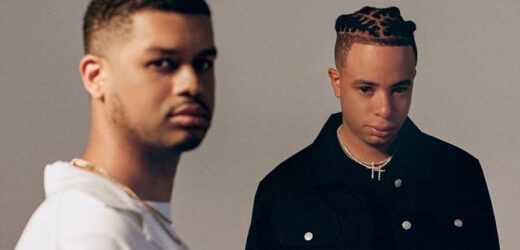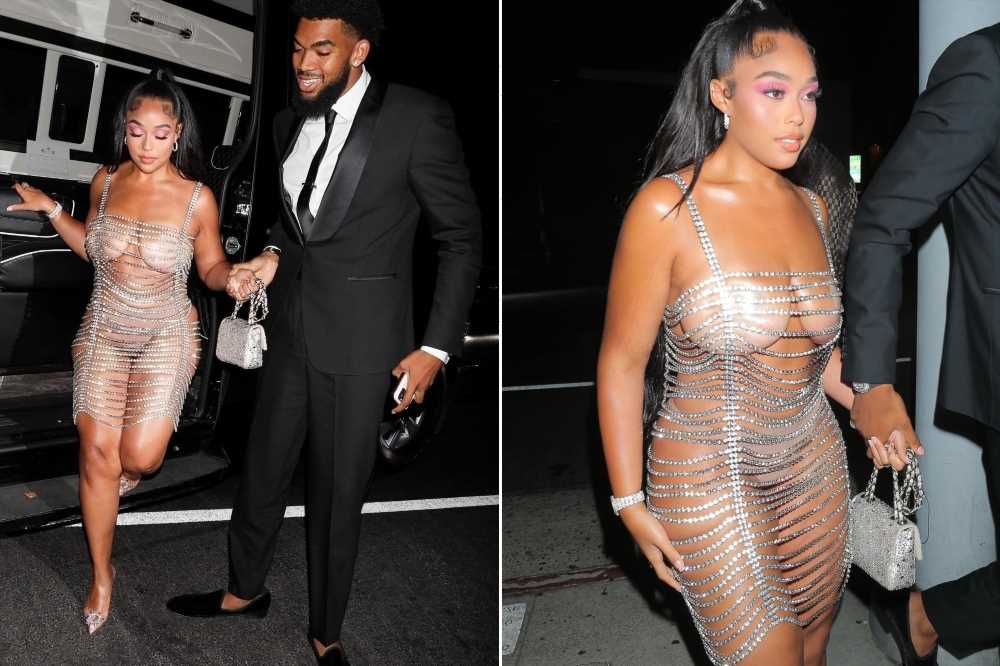David Biral and Denzel Baptiste, better known as the production duo Take A Daytrip, have spent years building worlds with Lil Nas X. You may have caught them in one of the Twitter guru’s latest videos, clad in scrubs and anxiously aiding Nas X as he delivered his debut album Montero like a newborn infant.
Take A Daytrip and Lil Nas X first met when they made Nas X’s “Old Town Road” follow up, “Panini,” and over time have developed a special kind of working and personal relationship. Though the pair has an impressive resume of credits under their belt, with artists like Juice WRLD, Travis Scott, and Kid Cudi, the two producers count their partnership with Lil Nas X as a particular source of pride and growth.
Related Stories
Six Things We Learned From Lil Nas X's 'Montero'
Lil Nas X Makes Us Like Him Even More on 'Montero'
Related Stories
The Beatles in India: 16 Things You Didn't Know
How True Is 'Respect'? Fact-Checking the Aretha Franklin Biopic
“We basically had to come up with a new way of creating,” Denzel explains of their post – “Old Town Road” union. “Because at that point, Nas had only done songs from hearing a beat, and then creating the entire thing in his head, and the 13th time he tried that, it was the biggest song of all time.”
In the midst of the pandemic, Take A Daytrip spent months hunkered down in Los Angeles helping create Montero. It would be the pair’s biggest project yet. They served as the album’s executive producers, as well as producing about two-thirds of the record themselves. The job was a good match for Daytrip, who’ve been right beside the relentlessly inventive Lil Nas X as he’s stepped confidently into the forefront of pop culture. Now, with Montero, they’ve constructed a space for him to express himself fully. The album finds the burgeoning pop icon at his most confessional.
Together, Take A Daytrip and Lil Nas X have developed both a creative process and friendship that has paved the way for one of the year’s most anticipated albums. Ten years from the week David and Denzel met as freshmen at New York University, they spoke to Rolling Stone about helming Montero, melding with Nas, and making music that matters.
So you met at NYU, how did you become Take A Daytrip?
David: Our class was always a really tiny class, so it was easy to really get to know everyone right from the jump. But on top of that, there weren’t a lot of kids of color. There weren’t many Black kids in the program, and I think right away me and Denzel just gravitated towards one another, from our own personal life experiences, and the type of towns that we come from, both pretty small farm towns in our respective states. And from there, after the introduction, we really started to learn what we’re influenced by, and what we geeked out on. We would hang out all the time and share music, sneak into clubs, and just experience New York City as a whole probably for those first two years. Towards the end of our sophomore year, during our spring break we went on a trip to Miami. And it was during Ultra Music Festival, and Winter Music Conference at the same time, and to us being young kids, we were just like, we just have to be around where the music is happening, no matter what. We just have to be there.
We were able to hang out with one of our managers Jon Tanners for truly the first time on this trip. Me and Denzel had the opportunity to make some music while we were down there that we quickly realized was just different from what we were making in New York. And a lot of it came down to just being inspired from the place that we were in, and taking the experiences that we were experiencing, and just translating that into the music that we were making. When we came back, that’s when the three of us were like, “Oh, we should maybe do something. Maybe because of this trip that we had, this experience that we all had together, we should really do something and figure out what it’s going to be.” And that’s when the three of us sat down and came up with the name Daytrip. We wanted to name ourselves that to constantly remind us that our biggest goal in life is to see the world through music.
You both have pretty expensive musical training. Tell me a bit about it.
David: So I was born in Providence, Rhode Island, and around kindergarten is when I started taking conga drum lessons. And then in first grade I started taking my first piano lessons. I took jazz piano lessons for about seven years. When I moved to Vermont I switched to jazz music lessons. I started DJing when I was 13….I joined my jazz band in high school, and was able to bring turntables and congas into my high school jazz band experience, and at the same time was taking piano lessons on the side. Me and Denzel met at the Clive Davis Institute for Recorded Music at NYU, where I started to learn how to produce. Our majors were production, engineering, and music business focused.
Denzel: My parents over the years have reminded me a lot of the stories — I was the kid that would get a bunch of pots and pans and start playing them with spoons. After that, every summer instead of a sleep away camp, I would go to music camps and jazz camps. And then it just kind of pushed me along way faster as far as learning instruments and theory, and then every time I would try out for band for fifth grade, they were like, “Whoa. You should play with seventh graders maybe.” Until probably the end of high school, I was playing drums in my church, and the music director at that church — one of those big, televised Baptist churches — is also a producer. He produced Toni Braxton, and Joe, and all these things. He’s the one who taught me production. So I would go over to his studio like it was a job.
When did you start working on Montero?
David: The core of the album today, a lot of those songs are songs that we started pretty much from the beginning of the pandemic, and through the first summer of the pandemic. And before that, kind of between the period of “Panini” and “Rodeo,” a lot of it was still getting to know each other, not just knowing each other as people, but also to know each other creatively, and what the best ways to work with one another are. It’s been a process of learning the best ways to make each other feel comfortable, where we’re allowing Nas to be so vulnerable in his music and tell all the stories that he wants to tell.
How would you guys describe the soundscape of Lil Nas X’s album that you’ve executive produced?
Denzel: I think Nas looks at music the same way that we do, where it’s not that we look at genres in the traditional way. The way that David and I look at genres, they’re just boundaries and rules that people set up to kind of make more sense of things. We really look at [music] as different emotions. So, Nas’ album dives into whatever best represents that current emotion, and whatever is the most efficient way to get that out regardless of what rules you’re supposed to have within certain songs. We were able to zero in on specific emotions because of the writing process. The process that we developed through the past couple years is that we start with just a musical bed, whether it be just a loop that we’re playing over and over for Nas to do melodies too, or it’s something that one of our friends sends us. And in that state, it’s almost genreless, because there aren’t enough elements in there to define what it is and what it isn’t.
It’s just a blank slate genre-wise, but contains an emotion within it just harmonically. So based on how Nas then interprets that, and then starts to add his emotion through just melodies and lyrics, then we start to dive in with, “Okay, what is this just sonically making us feel? What do we want to make it feel?” And then we start pulling all these different references, like, “Oh, this has the same emotion, this ’80s rock song has the same emotions. This HBCU marching band performs the same emotion,” and then we start pulling these things together, and then building it out like that.
Were HBCU marching bands inspiration for “Industry Baby?”
Denzel: 100%. We literally spent every single day together throughout the spring that the pandemic started, all the way through the summer and then onward, we were pretty much just hanging out, grilling food, just going to the mall and stuff and talking about all these things. And the constant thing that kept coming up was that people were saying that Nas fell off. And he’s such a social media person that he was reading pretty much every single comment, and even though 100,000 people can say great things, the 10 people that say bad things will still get to you no matter what. So, that was a recurring thing, that people were saying, “He took too long to put out new stuff.” And even we were like, “Oh, has it been too long since we put out the last thing?”
Nas and all of us were just like, “You know what? That’s not what this is. We’re actually coming together and putting our minds together to create something way bigger than anything that has ever come before that we worked on.” So it was like, “You know what? We got this. We’re confident in what we’re doing, nothing’s going to stop us,” and it’s the same emotion when you’re five points down, about to lose a game, but your team knows, “We’re going to do this. We’re going to put this together.” Marching band comes in, it’s the end of the movie, the last scene is like, “Watch this. Watch what we’re about to do.” It was that same emotion.
And how did the co-production with Kanye West work with “Industry Baby”?
David: So me and Denzel didn’t get to meet Kanye, but Nas had the opportunity to sit down with him and play him a bunch of records from the album, maybe two months ago now. Kanye specifically picked out “Industry Baby” and just from what Nas told us, Kanye gravitated to that one just because it reminded him of some of his anthemic moments, like “All of the Lights.” He just wanted to come in and really give it an overall finishing touch. So he came in and helped layer some instruments and really helped beef up the production, and sent us all the parts back, and we were able to take all of those things and place them in, and finish it up with Nas.
Even just the simplicity of that process is a dream come true for us. We both grew up idolizing so many of Kanye’s iconic albums and so many of his moves within those. Being able to be a part of something that Kanye has touched is just…the middle school me is just like…it’s just one of those things that’s truly a dream come true.
Could you speak to the biggest lesson that you each have learned creatively through working on this project?
Denzel: The biggest lesson for me is removing fear in the creative process, but then also in life — kind of identifying where your fears are, and then knowing how to work around them. Through this process, obviously, Nas has gone from not even being an openly gay person, to what his music is now. We’re all boys hanging out, and then he’s saying these things that are so personal to him. Even in a normal social sense, you would have a fear of saying these kinds of things in front of your friends.
On our end, it’s been interesting to go into genres that we haven’t delved into in [this] way. There’s definitely not as many Black producers in pop music. So us even removing fear of, “Oh, are we doing this right? Is this the right way you do things at this level, in this genre?” And just kind of really trusting our gut and our intuition and trusting each other, and not being afraid to fail and go down a path that we’d work on a song for three months, and then at the end it doesn’t work. There’s still a fear of even failing in front of your own team that kind of restricts you. So, just the removal of all that has removed a lot of restrictions for all of us.
David: I’d say for me, patience is probably the biggest thing. This is the first time that we’ve really had the opportunity to create a record on the first day, and then have the ability to work on it with the same person for months. And it’s been a true process of just learning how to take something that from the first day, a song could be 80% done, and within that last 20% when it comes to editing vocals, picking background takes, just all the little technical things that we also learned in this process, along with Nas, really took a lot of patience from all of us. When a record’s at 80%, that 20% might take six months. We’re all going to lock in and just get it done, because we know at the very end of the finish line it’s going to be a great record.
When you think about Montero, what are you each most proud of?
Denzel: I’m so proud and grateful to have seen the transformation in a person as drastic as Nas pre-this album and Nas post-this album. In the most simple way, when we first met Nas, he was the most quiet and reserved, wearing jeans and a Nike t-shirt. Fast forward two years to him being a style icon, an outspoken representation of his community, and really being a thought leader in that community. That transformation of being completely silent then to being completely yourself, and not caring who has problems with it, but knowing that what you’re doing is the right thing, and not having any reservations about any of that. That’s the biggest transformation to me. I was just thinking about how much he went through and that we were able to be a part of what has changed his life so drastically. That’s something that I’m most proud of, the change that it’s made for Nas, and the change that it’s been able to make for all these other people.
David: From our own eyes we’ve seen confident, social media Nas, which is kind of where he started to really express himself as a human being. That expression, that confidence that he had from his early days, from stan Twitter and all that kind of stuff, I think now we’re starting to see that confidence catch up to who he is in real life.
It’s truly been such a blessing to be a part of that journey. Simply being able to help someone as inspirational as Nas tell his story, and help be the backdrop of all this music, has really been one of the most important things in my life, and I’m sure in Denzel’s life as well. To be able to work on a project like this with such an inspirational person, it’s not something where I’ve come in, I’m just like, “Oh, I’m going to make a beat,” someone hops on the song, and I leave. I leave every single room learning something new. Over these past two years, I’ve been able to learn so much, and also have seen the knowledge that I’ve learned start to resonate within other people as well.
This is the type of work you only hope and pray to do, leaving this kind of impact on humanity. And it’s been such an incredible journey stepping into a room with a kid that just turned 21, and “Old Town Road” was the biggest song in the world, and making “Panini” the first day we meet him, the beginning of “Rodeo,” and see this kid on top of the world and then help him through these moments of doubt all together; to see him come back around, and regain his confidence back in a whole new way, and truly see the birth of a pop star. To be alongside of that has just been one of the most amazing experiences I think I’ve ever had and it’s something that we want to be a part of for the rest of our lives.
Source: Read Full Article



